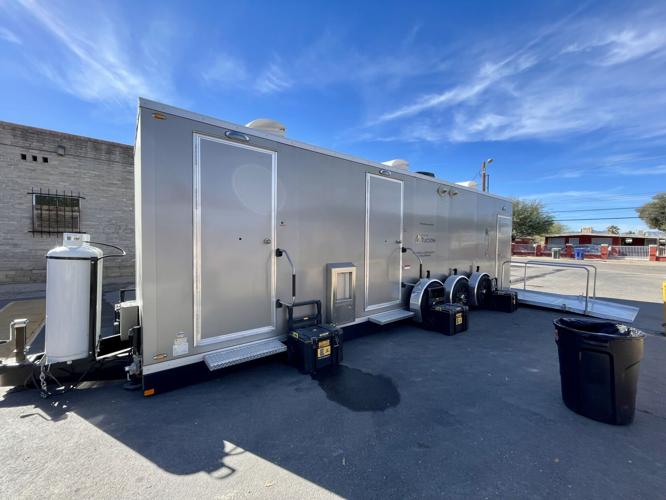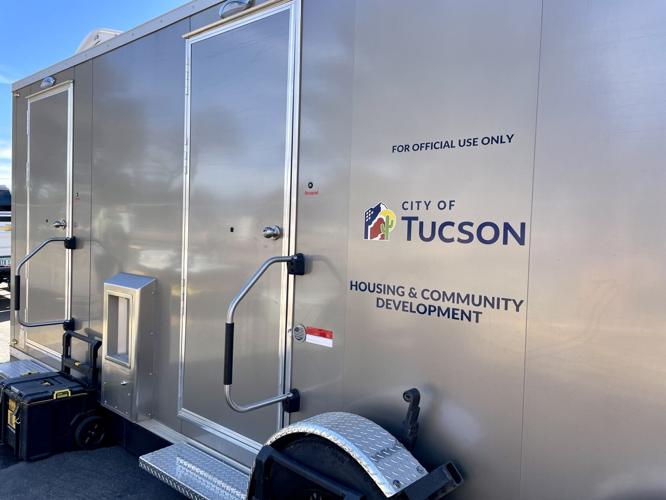Taking a shower is something most Tucsonans don’t think twice about.
They can start their days and end their nights with this simple act of personal hygiene. But for some of Tucson’s unsheltered, it could be days, weeks or even months before they know when their next shower will be.
A City of Tucson Housing and Community Development program wants to change that.
The City of Tucson HCD’s new portable shower trailer offers warm showers for free to individuals experiencing homelessness (and others going through a tough time). The five-person mobile shower trailer moves around town daily to help underserved communities.
While the schedule is subject to change, currently the HCD shower trailer is at the following locations:
- Caridad Community Kitchen, 845 N. Main Ave., from noon to 4 p.m. Mondays.
- Zion City Santa Cruz location, 1775 W. Ajo Way, from 10 a.m. to 2 p.m. Tuesdays.
- Sacred Heart Church, 601 E. Fort Lowell Road, from 11 a.m. to 2 p.m. on the last three Wednesdays of the month.
- Primavera drop-in center, 702 S. Sixth Ave., from 8 a.m. to noon on Thursdays.
- Casa Maria Soup Kitchen, 352 E. 25th St., from 7-11 a.m. every second and fourth Friday of the month.
- Goodwill REC Center, 1920 E. Silverlake Road, from noon to 4 p.m. on the first and third Friday of the month.
The trailer also visits the StandUp for Kids Tucson outreach center, 5375 E. Pima St., to connect with local unsheltered and at-risk youth from 11:30 a.m. to 3 p.m. on the first Wednesday of the month.
“The idea is to get this out to the individuals in the community that are unsheltered,” says Shane Wilson, an outreach specialist for HCD and the shower trailer operator. “We provide towels, body wash, conditioner and shampoo. They are able to utilize it for 15 minutes. We try to carry clothes with us; we bring both men’s and women's clothes. But we do need donations of men's clothes more than anything right now.”
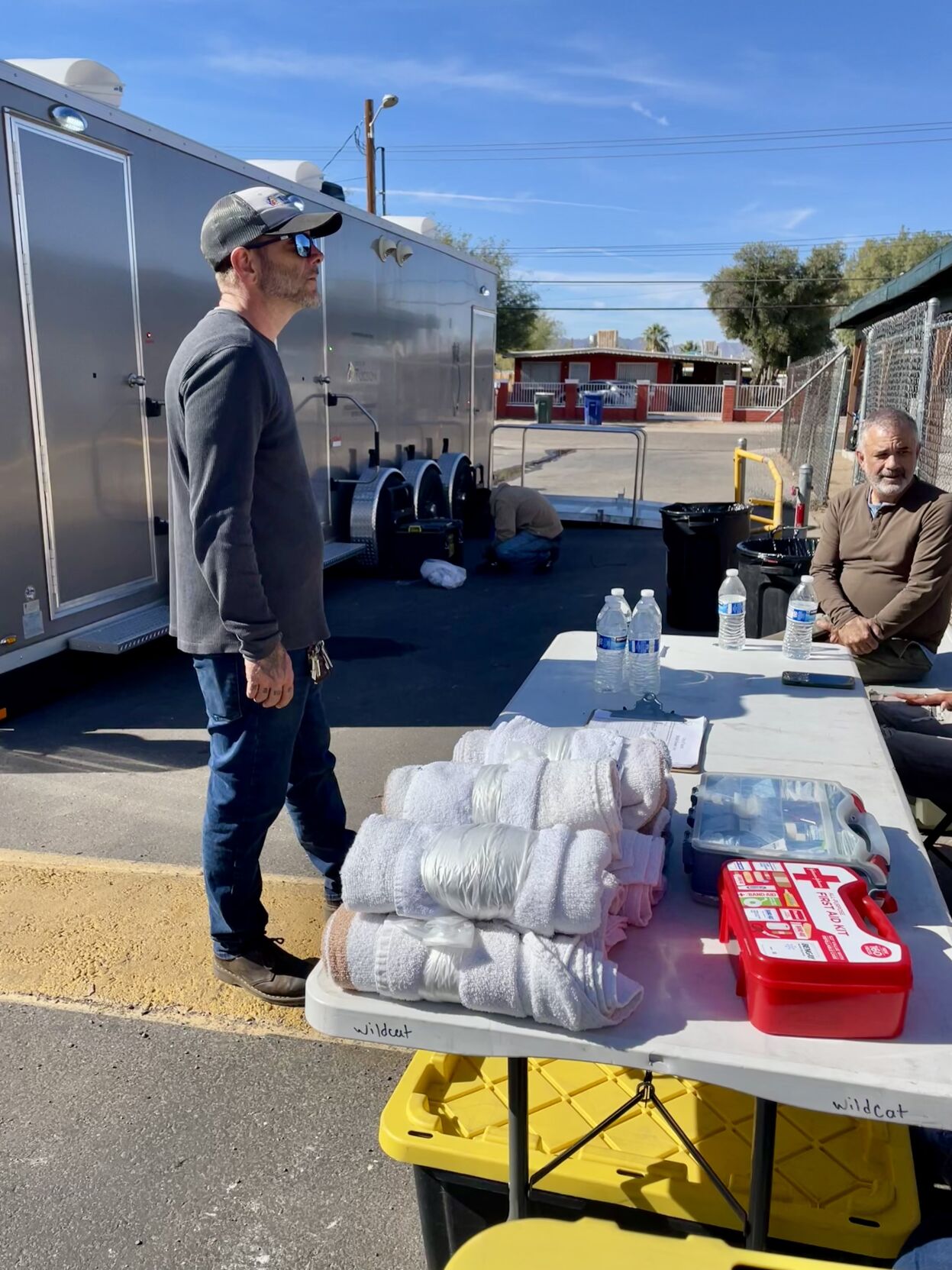
Shane Wilson looks at Amphi Park to see if any of the area's unsheltered community is interested in taking a shower at the city's free shower trailer on Jan. 17.
The pilot program launched early last year thanks to grants from Project Gateway, an Arizona Department of Housing funding opportunity that helps several operations, says the HCD’s Housing First program director Brandi Champion.
Initially, the program was launched with a borrowed shower trailer from the Salvation Army. The city recently purchased its own shower trailer, which includes five showers including an ADA-compliant shower room, for $159,100, according to Champion.
“We had 1,005 people participate in the shower program (last year),” she says. “So that's a big thing. It's necessary. What else can you do if you feel dirty or unpresentable? How are you supposed to tackle anything else, like going to an appointment, going to your other services, going to meet other service providers? So, I think it's a big benefit for our community. It's also a great engagement tool because we get some people that then say, ‘OK, I'm ready for shelter now.’ And we find them a shelter bed and we start working with them towards their housing.”
Making a difference in the unsheltered community, one warm shower at a time.
On a sunny, but cool Wednesday afternoon in mid-January, the HCD shower trailer is parked and ready to go at the St. Francis Shelter Community near the Amphi Neighborhood Park where a crowd of people have congregated.
Two volunteers with the program, Ashley Deal and Sarah Wingrove, walk around the park, informing groups of the free showers. While there are no immediate takers, there are plenty of curious glances at the parked trailer.
About an hour passes before Luis Acosta, 36, wanders over and asks if he can take a shower.
The volunteers happily explain the process: write down some basic information and put your belongings in the storage chest outside the shower room. You have 15 minutes to take a warm shower and then leave your dirty towel in the large plastic bucket by the trailer when you’re done. They hand him a clean towel and a fresh pair of underwear before he heads inside the trailer.
Around 15 minutes later, Acosta emerges from the trailer with a clean face and wet hair. He's noticeably happier than when he went in.
Acosta has been unsheltered for about a year and had never used the shower trailer before that day in January.
“It was awesome,” he says, adding: “To be honest with you, I feel blessed and grateful and thankful. Not too many places can say they got this and it’s very clean and I like it. I like it.”
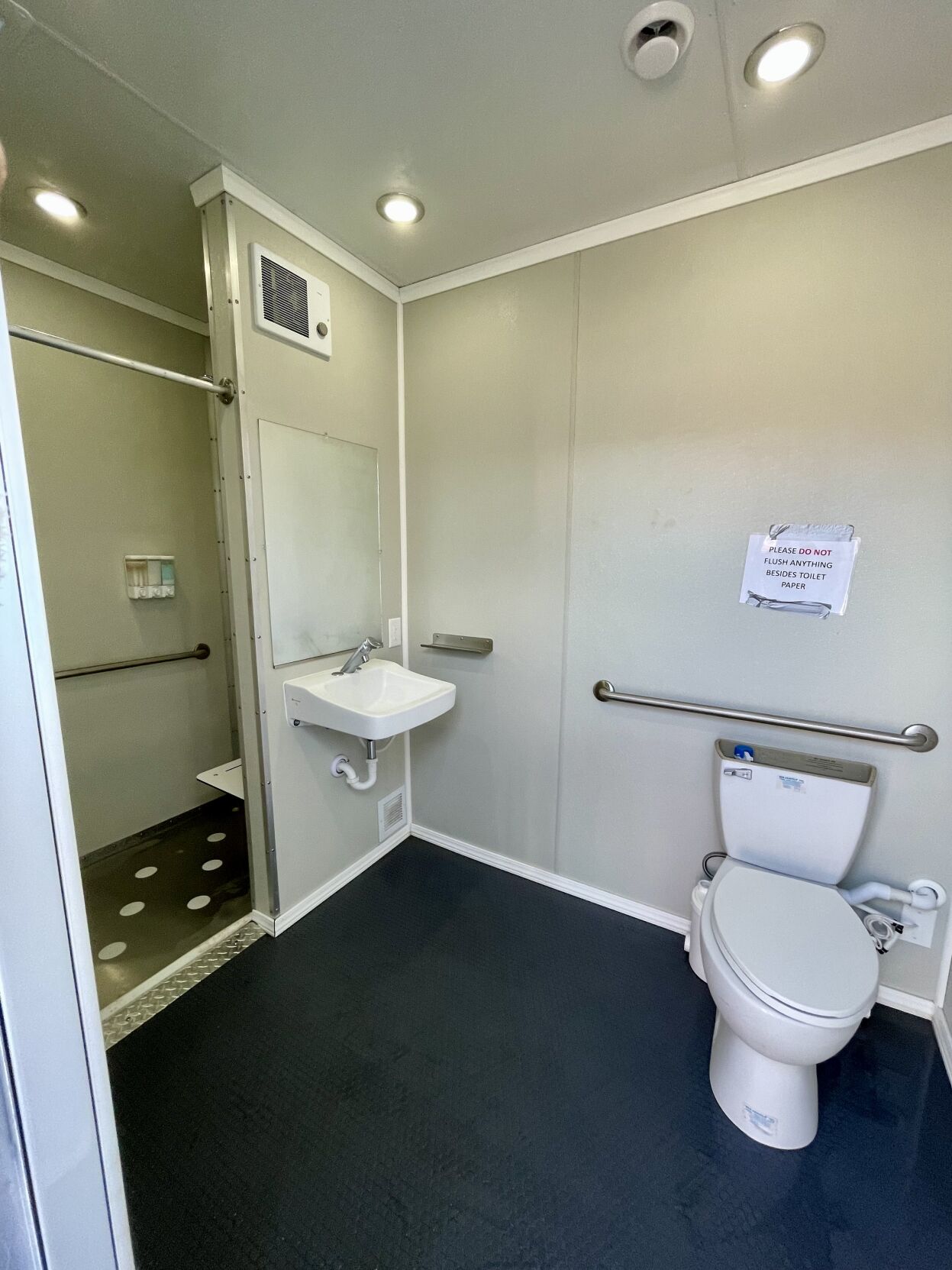
An inside look at the City of Tucson HCD shower trailer parked behind the St. Francis Shelter Community at 601 E. Fort Lowell Road on Jan. 17.
A little while later, Daniel Benavitez, a regular at the trailer, stopped by for his 15-minute shower.
Benavitez has been unsheltered for around a year, but he doesn’t prefer to be called “unsheltered” or “homeless.” Instead, he says he’s “inner-city, off-grid living.”
After his shower, he grabs his belongings from the storage container, cleans off his white Nike shoes, puts on his black baseball cap and heads north on foot. He’s sure to be back next week.
“It’s common decency of humanity to allow someone to be decent,” Benavitez says. “You feel human again. You don’t feel as human when you’re dirty as f—k and you don’t really have a place to shower or you’re nervous or scared to knock on a door and say, ‘Hey man, can I use your hose real quick?’ Or you get looked at a certain way because you’re showering outside. A lot of people don’t look at that because the majority of society lives in a house or apartment and have access to a shower. People on the street don’t have that.”

The City of Tucson HCD shower trailer parked behind the St. Francis Shelter Community at 601 E. Fort Lowell Road on Jan. 17.
When 1 p.m. rolls around, about an hour before Wilson packs up for the day, the crowd starts to disperse and the trailer begins to slow down. That day, the trailer helped around five people, but on other days at different locations, it can help up to 15 or more people.
When the trailer isn’t traveling around town, its home base is at the Wildcat Inn, 1701 N. Oracle Road. Those looking to donate clothes for the portable shower can drop them off there.
On average, it takes around $20,000 per month to operate the trailer, including buying supplies like shampoo, soap and clothing, according to Champion.
'I wish this was here when I was homeless.'
For Wilson and the shower trailer volunteers, this program hits home.
Wilson, who is originally from Massachusetts and moved to Tucson almost 20 years ago, says he’s now been in recovery for 10 years.
“I’m trying to give back to the community, you know, it could be me out here, it could be me and one of my co-workers, family or friends,” he says.
Deal, a regular volunteer, was unsheltered about two years ago until she went through the city’s housing program. She’s volunteered with the program for almost a year and enjoys hearing stories and updates from the weekly regulars.
“I’ve seen a lot of reactions from people showing up in areas where we locate,” she says. “And they're really happy to take a shower. Now, honestly, I wish this was here when I was homeless.”
Zion Alderette, 32, another regular volunteer with the program (as well as a volunteer with the St. Francis soup patrol program), unsheltered for around a year and a half in his late 20s. During that time, he went three months without taking a shower during Tucson’s scorching summer heat.
He says a resource like the shower trailer is a “blessing” and can be “life-changing” for people.
“When I wasn’t able to shower, I tried to go to the courthouse to file my divorce and I wasn’t even allowed to go into the courthouse. The guards said I couldn’t go in,” he says. “Everybody has a life, everybody has to do something and this is one thing that overcomes one barrier.”
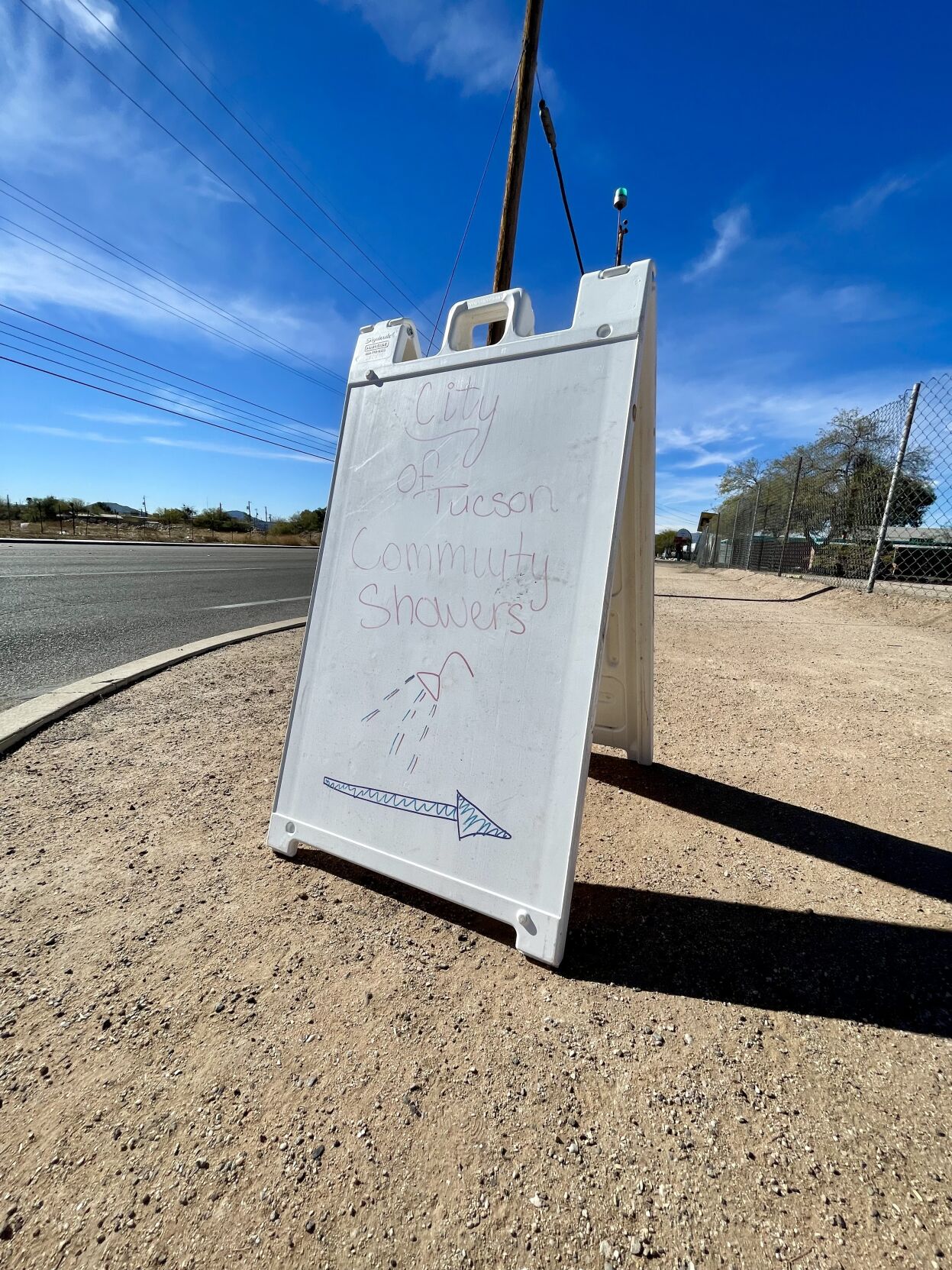
A sign along East Fort Lowell Road points toward the free City of Tucson HCD shower trailer behind St. Francis Shelter Community on Jan. 17.
In 2023, the City of Tucson’s Point-in-Time count, which is designed to “provide a snapshot of households experiencing homelessness on a single night,” reported a 60% increase from 2018, “which represents an increase of 829 people over five years. For the first time since 2019, the 2023 count of persons in temporary shelter locations increased by 22%, totaling 708 persons, and the unsheltered count decreased by 9%, totaling 1,501 persons (148 fewer unsheltered persons than in 2022).”
The Tucson Pima Collaboration to End Homelessness, which works closely with the City of Tucson, aims to prevent and help end homelessness in the city by implementing various strategies including “coordinating street outreach and engagement services to promote service and shelter participation among unsheltered persons” and “improving coordination between justice, behavioral health, social service and mainstream housing resources,” according to the PIT count report.
The HCD portable shower trailer program contributes to these strategies because of outreach coordinators who connect with Tucson’s unsheltered individuals through a new resource that can bring them closer to finding housing — all while giving this community a shred of dignity back.
“We're able to make the connection and get those folks into their housing program, which is beautiful. It's a beautiful thing. It just keeps us in the loop with our homeless population,” Champion says, adding: “I want to see it expand, I always want to see everything grow. We tried this for a year, huge success. And not too many malfunctions with the shower trailer, it was not out of commission for a long time. So, I would like to see us expand and maybe even get another one.”


